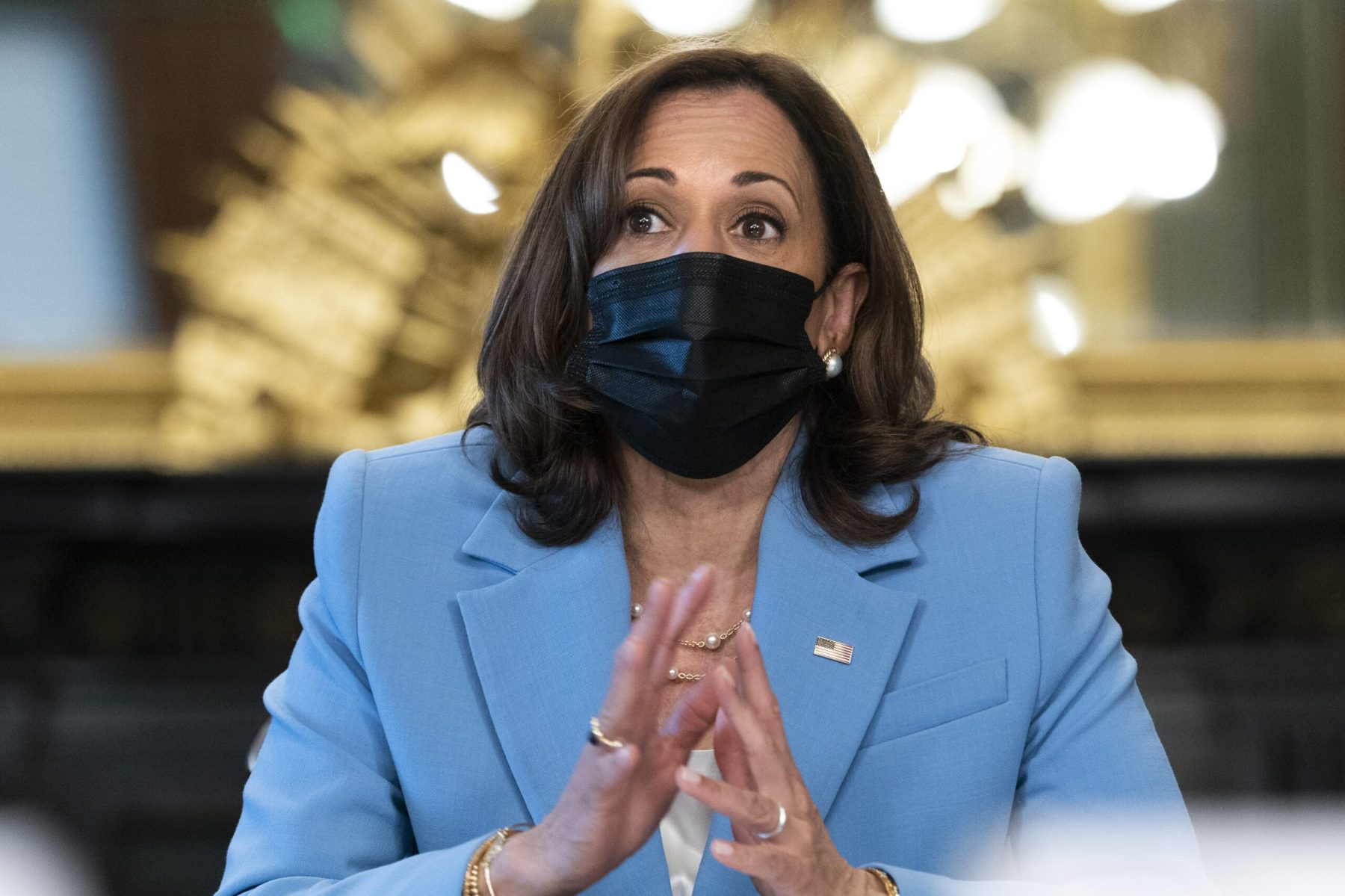The ongoing dustup over Vice President Kamala Harris describing herself during a meeting with disability rights leaders this week is much ado about an increasingly common practice and a distraction from the substance of the gathering, advocates say.
On Tuesday, Harris began the meeting marking the 32nd anniversary of the Americans with Disabilities Act by describing herself: “I am Kamala Harris. My pronouns are ‘she’ and ‘her,’ and I am a woman sitting at the table wearing a blue suit.”
This brief moment was roundly criticized by political opponents and in right wing media.
Republican Rep. Adam Kinzinger of Illinois tweeted, “If you ever wonder why the left can’t win elections despite the insanity of Trumpism, save stuff like this for reference later.” Senator Ted Cruz of Texas, Rep. Lauren Boebert of Colorado and a slew of other Republican politicians also made jabs on social media. Senator Marco Rubio of Florida went on Fox Business and jokingly described himself as a “man on the screen with a gray suit on” and was greeted with laughter from the host.
At The Atlantic, staff writer Graeme Wood said Harris was “hopelessly liberal or simply out of her mind.” To Wood, she “sound[ed] so much like she was from outer space.”
But to blind and low-vision viewers, the vice president was simply doing a visual self-description, a practice meant to better include them in meetings. People engaging in visual self-description provide a brief overview of what they look like and what they are wearing — any details they feel may be important for blind and low-vision participants.
“It’s just access to information that someone sighted would have,” explained Thomas Reid, a blind audio producer and podcaster who has worked with companies like Netflix and HBO to expand their audio description for blind audiences.
“Kamala Harris said she had a blue suit on. OK, so now I know how she dressed for the occasion. That means it was a very professional thing. Saying it makes that information accessible to people who are blind,” Reid said.
Visual self-description is relatively new, and the precise origin of the practice is unclear.
“It definitely started in the past few years, but I don’t know exactly who started it,” Reid said.
“It’s not from the National Federation of the Blind. It’s not something we originated, and it’s not something we’ve prioritized,” said Chris Danielsen, the organization’s director of public relations. The National Federation of the Blind is one of the oldest and largest blind-led organizations in the United States.
The federation does not have an official position for or against visual self-description, according to Danielsen.
“Vice President Harris was acting with the intent to be more inclusive. And we absolutely respect that intent,” Danielsen said.
Jasmin Bailey, manager of business operations for the American Association of People with Disabilities, became blind later in life. She finds visual self-description useful and introduced the practice to the organization. It is now a normal part of meetings and other programming.
“When I’m in a meeting, I’m always curious: What is the speaker wearing? What do they look like? That’s information sighted people just have. It’s information I would like to have as well,” Bailey said.
The American Association of People with Disabilities was one of the organizations present at the meeting with Harris. Although Bailey herself was not in the room, she praised Harris for engaging in visual self-description.
“[Using visual self-description] demonstrates [Harris] was thinking about the inclusion of all people. I applaud Vice President Harris for being a leader and for ensuring she was able to engage all people attending the meeting,” Bailey said.
Though the practice is growing, not everyone agrees that it’s useful.
“People have different opinions based on their lived experiences. I’m a totally blind person. I was born totally blind. This is just me personally, but I don’t necessarily find it all that helpful to be told how people look,” Danielsen said.
Lydia X. Z. Brown, director of policy, advocacy and external affairs for the Autistic Women and Nonbinary Network, was one of the advocates at the table during the meeting with Harris. Brown believes that the reaction to Harris’ visual self-description is primarily rooted in anti-trans sentiment, noting that Harris identified herself as a woman.
“The mere act of mentioning what a person’s pronouns are is apparently incredibly triggering to a lot of people who would rather trans people not exist, or if we do exist, that we shut up about our existence,” Brown said.
Brown is nonbinary and was pleased that Harris used a visual self-description and shared her pronouns with the table.
“It is disappointing and upsetting that the vice president’s attempt to be more inclusive and accessible has been met with such vitriol and hostility,” Brown said.
Race also plays a role in the debate over visual self-description. Haben Girma, the first deaf-blind person to graduate from Harvard Law School, is in favor of visual self-description because she has been mistaken as White in blind community spaces. Girma is Black.
“It happens a lot in the blind community, listening to my voice and assuming I look a certain way,” she said in a video on her YouTube channel last year.
Girma believes that opposition to visual self-description is based on a desire to avoid acknowledging uncomfortable truths.
“Many blind people who don’t want visual descriptions live with a lot of privilege. Questioning your own privilege can feel uncomfortable,” she said via email.
“Our complexions have so much meaning in our society, in terms of how we have been treated historically in this country,” Reid said. Whether people want to acknowledge it or not, race impacts how people treat each other, according to Reid.
“White folks aren’t used to describing themselves. They’ve never had to. Whiteness is treated like it isn’t a distinguishing factor,” he said.
While Harris did share her gender during her visual self-description, she did not share her race. Reid does not think this poses an issue, although it is information he normally recommends people share if they feel comfortable doing so.
“Everybody knows by now that Kamala Harris is Black,” he said.
Advocates at the meeting, including Brown, have expressed frustration with how much attention Harris’ brief visual self-description is getting rather than the content of the meeting. Leaders discussed the specific issues facing people with disabilities in a post-Roe world, including higher rates of sexual assault and forced sterilization.
“Why aren’t reporters covering the substance of the meeting we held yesterday? The discussion we had was about disparities and access to health care. It was about disabled people’s higher rates of complications from pregnancy. It was about the experiences of disabled people of color, disabled people who don’t speak English, disabled people who are trying to raise children,” Brown said. “No journalist has reached out to us to ask about those issues.”
In particular, Brown highlighted the parental rights of people with disabilities. They recounted being called late at night because a disabled woman’s newborn child was being taken away after she was seen as unfit solely because of her disability.
“Instead of real issues, there’s dozens and dozens of articles about this temper tantrum that the right wing is throwing because Kamala Harris described herself and mentioned her pronouns,” Brown said.







